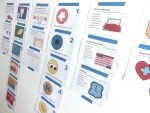We ran a safe-to-fail video experiment. We succeeded. Yay! Will you help us make the…
My Time Registration Experiment
I learned that personal time registration didn't add much value to what I already do every day.
Two weeks ago I told you I was going to measure the time I spend on my work, in the hope of learning a bit more about myself. And so I did. For two whole weeks I tracked all my activities and the time I spent on them.
It was harder, and more annoying, than I thought. My original plan was to do this for a month. But after two weeks I was sick and tired of clicking the start/stop timer on my smartphone, and I decided to cut the sample size in half, hoping that the data I collected so far was useful enough already.
These are the (aggregated) results:
| Eating | 5% |
| Communicating | 10% |
| Socializing | 11% |
| Traveling | 14% |
| Learning | 16% |
| Teaching | 23% |
| Publishing | 5% |
| Presenting | 6% |
| Other | 10% |
Learning from Experimentation
These are my conclusions:
- I spend 10% of my time communicating online (email, Twitter, chat and phone). This is just what I expected, and it’s fine as it is.
- I spend 11% of my time socializing with people face-to-face, in meetings, conferences, and hotel bars. No problems there either.
- About 14% of my time is wasted on traveling. That is time I actually waste doing nothing. (When I read during my travels I counted it as learning.) The waste of traveling is more than I expected!
- About 16% of my time is spent on learning. Most of that is spent on reading books. A small part consists of conference sessions.
- I spend no less than 23% of my time teaching. That number is a bit high because I did 2 courses in these 2 weeks, while I do 3 on average in a whole month.
- I spend only 5% developing and writing materials, including courseware, games, articles and blog posts. This is not enough!
- About 6% is spent on presenting at conferences, and everything that is needed to prepare the presentations, and provide aftercare for my victims audiences. No problems there.
- The remainder, about 10%, involves many tasks that are too diverse and small to categorize separately. Some of that stuff I could probably do more efficiently, but there’s little to gain from this category.
So, what did I learn?
The time I waste on traveling is too high, while the time I spend on publishing is too low. Everything else is more or less fine. This means that I now have a new challenge: find more effective ways to write and develop materials while I’m traveling, so that the time I spend writing blog posts in security lines, and drawing illustrations in taxis, counts as publishing and not as traveling. Your suggestions are appreciated! 🙂
Meta-level Learning
On a meta-level: Though the findings are interesting, I find the results of my time tracking not as revealing and surprising as I had expected. The effort of time tracking did not give me the return on investment I had hoped for. And it also did not help me to achieve better levels of self-reflection, which was my original intention.
Important: Time tracking can be still useful for you! My friends know me to be a very focused and disciplined person. (Sometimes even too much so.) The fact that I didn’t get much out of personal time tracking might mean I’m already quite efficient and effective at what I do. But I don’t know about you. 😉
I thought this experiment could work for me, but unfortunately it didn’t. I’ll move on to the next one…
So, how do you try and learn how to improve your daily activities?
(Jurgen Appelo is author of Management 3.0, a best-selling management book for Agile developers. It has a picture of a monster in it.)








